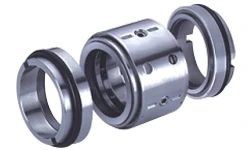Introduction:
Mechanical seals play a critical role in numerous industrial applications, providing a reliable and efficient solution for sealing rotating equipment, such as pumps, mixers, and compressors. In this article, we will explore the importance of mechanical seals, their various types, and their significant contributions to enhancing performance and reliability in industrial processes.
Understanding Mechanical Seals:
Mechanical seals are devices designed to prevent the leakage of fluids and gases by creating a secure and robust seal between two rotating or stationary components. They consist of two main parts: a stationary component attached to the equipment casing and a rotating component attached to the rotating shaft. The interaction of these components creates a seal that prevents the escape of fluids and contaminants.
Types of Mechanical Seals:
There are several types of mechanical seals available, each designed to suit specific applications and operating conditions. Some common types include:
Pusher Seals: These seals use springs to maintain the sealing face contact and compensate for face wear, making them ideal for high-pressure applications.
Cartridge Seals: Cartridge seals come pre-assembled, making installation and replacement quick and convenient. They offer a compact design and superior performance in various operating conditions.
Split Seals: Split seals are suitable for equipment that cannot be disassembled during seal installation. They are split into two halves, allowing for easy installation and maintenance without dismantling the equipment.
Gas-lubricated Seals: These seals use a gas barrier to separate the seal faces, reducing friction and wear. Gas-lubricated seals are often used in high-speed and high-temperature applications.
Advantages of Mechanical Seals:
Mechanical seals offer several advantages over traditional sealing methods, including:
Leakage Prevention: Mechanical seals provide a reliable and effective solution for preventing leakage, minimizing the risk of environmental contamination and equipment damage.
Enhanced Performance: By maintaining a secure seal, mechanical seals optimize equipment performance by reducing energy consumption and enhancing overall efficiency.
Longevity and Durability: Mechanical seals are designed to withstand harsh operating conditions, including high temperatures, corrosive environments, and high pressures, ensuring extended equipment lifespan and reduced maintenance requirements.
Versatility: With various types and configurations available, mechanical seals can be customized to suit specific applications and industry requirements.
Conclusion:
Mechanical seals are indispensable components in modern industrial processes, ensuring efficient operation, reducing downtime, and preventing leaks. Their versatility, reliability, and ability to withstand demanding operating conditions make them an ideal choice for sealing applications in diverse industries. By investing in high-quality mechanical seals and following proper installation and maintenance practices, industries can significantly enhance their equipment's performance and reliability. For more information visit the website.


